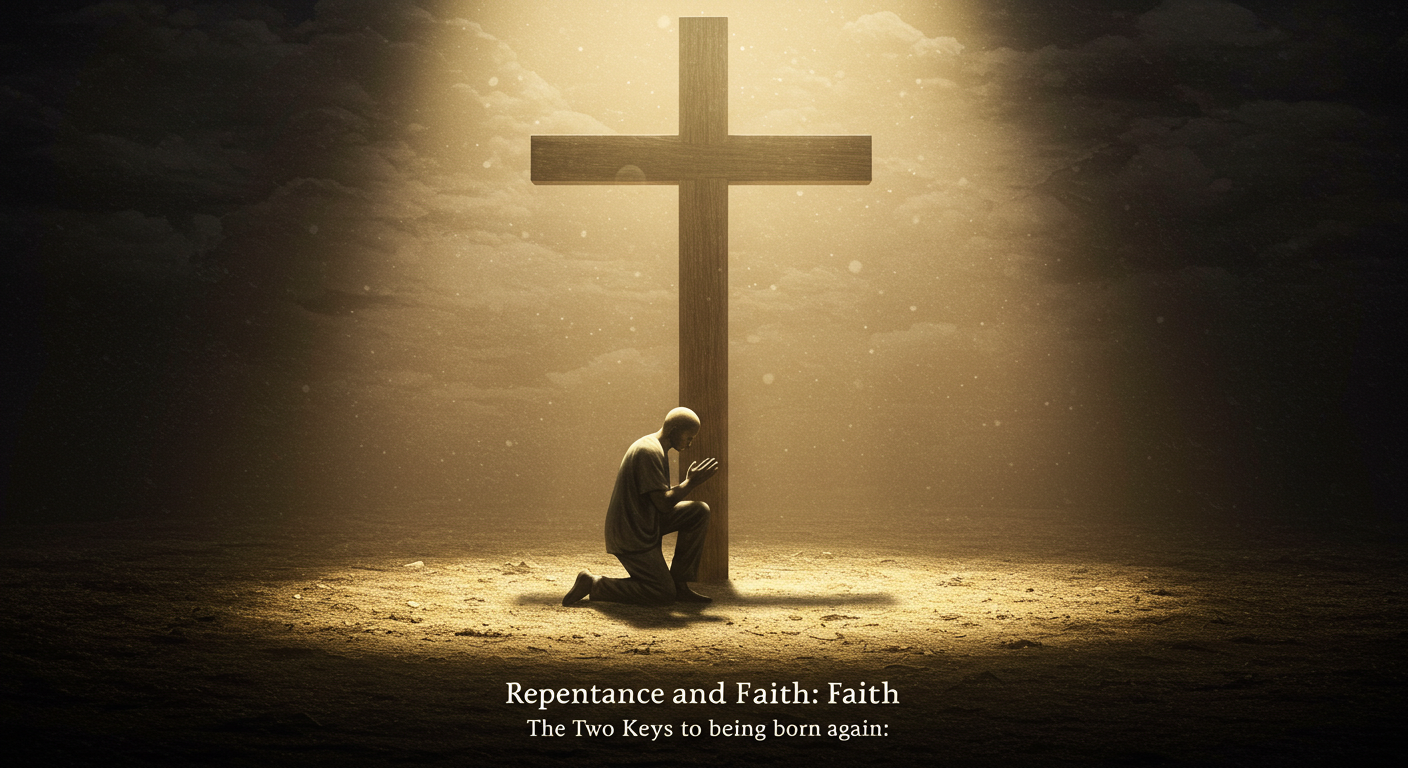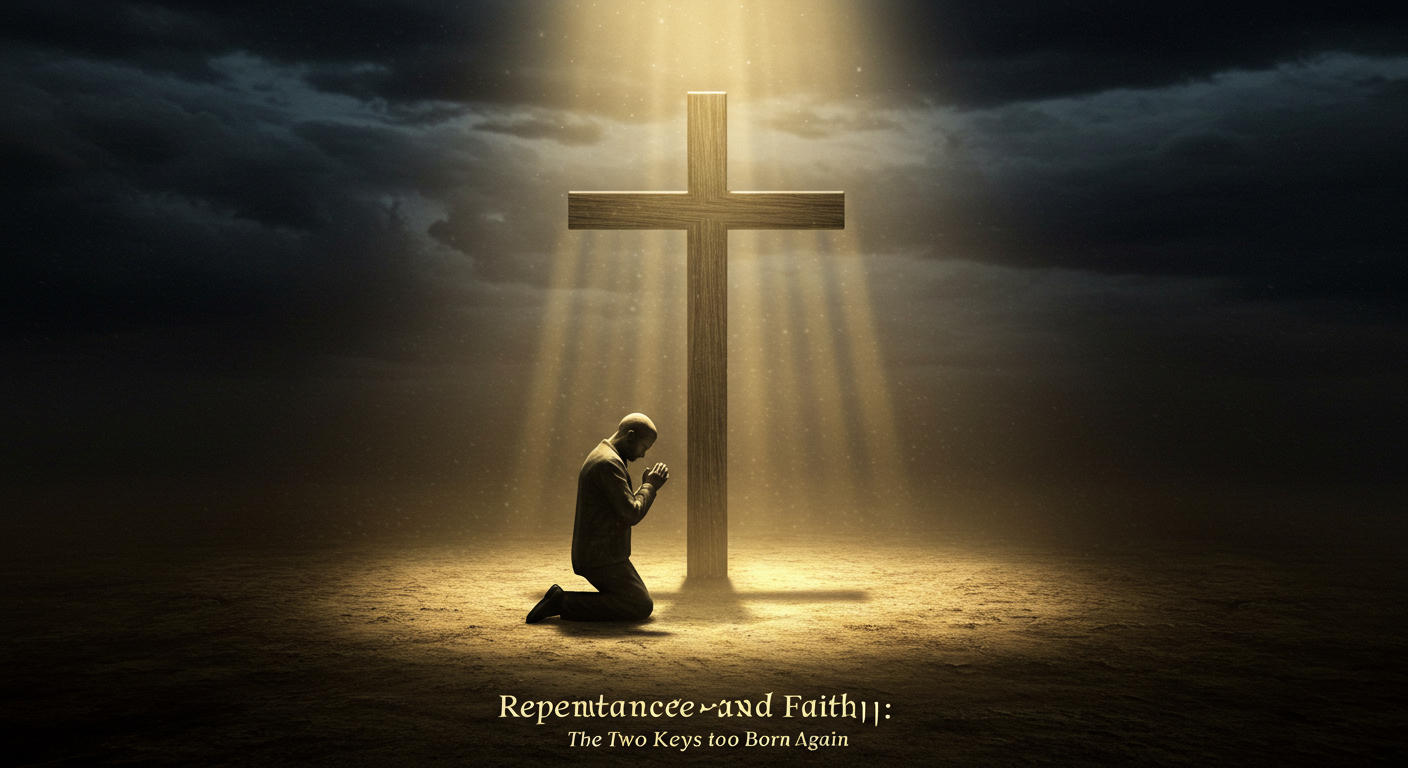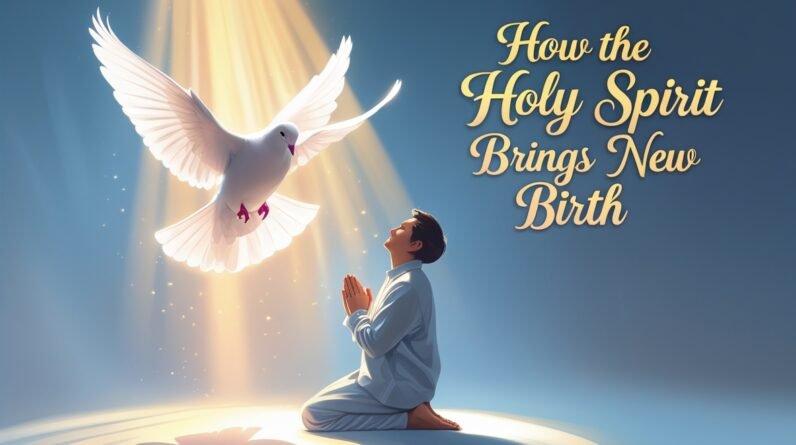Repentance And Faith: The Two Keys To Being Born Again
You’ve probably heard the phrase “born again” before. It’s a powerful, life-changing term. In simple, pastoral language: being born again means you experience a spiritual rebirth — a turning away from your old life and a fresh start in Christ. In this article, you’ll walk through how repentance and faith work together in that process, grounded in Scripture and practical guidance, so you can understand what it looks like for you. You’ll see why Acts 3:19 and Romans 10:9-10 are central to this conversation, and you’ll be encouraged to take steps toward the life God offers. For the biblical anchors in this article, you can check the verses directly: Acts 3:19 and Romans 10:9-10.
Why this matters to you
This matters because being born again isn’t an idea for someone else; it’s a reality God invites you into. If you’re searching for meaning, freedom from guilt, or a relationship with God, repentance and faith are the two keys that unlock that new life. You’re not asked to perform to earn it, but to respond — honestly and wholeheartedly. The goal is transformation: to become the person God created you to be.
What is repentance?
Repentance is more than saying “I’m sorry.” It’s a change of mind and direction — a deliberate turning away from sin and turning toward God. Repentance involves recognizing that your actions and attitudes have been wrong, feeling genuine sorrow for them, and then choosing a new path.
The heart of repentance
At the heart of repentance is humility. You admit you were wrong and need help. That admission opens the door to grace. Scripture calls people to repent as a necessary step toward restoration and healing. See Acts 3:19 for the apostolic call to repentance: “Repent, then, and turn to God, so that your sins may be wiped out…” The verse shows that repentance is not merely ethical improvement; it’s relational — returning to God.
Repentance is not just behavior modification
You might think repentance is only about changing outward behavior. But it begins in the heart. This means you ask God to reveal the attitudes, motives, and beliefs that led you into harmful patterns. True repentance produces fruit — new choices and habits — but it’s rooted in a transformed heart. It’s the inward work that leads to lasting outward change.
What is faith?
Faith is trusting in Jesus Christ — trusting His person and His work on the cross. Faith is not a feeling but a reliance on the truth that Jesus died for your sins and rose again. When you believe that with your heart, you’re responding to God’s offer of salvation.
The nature of saving faith
Saving faith involves more than intellectual agreement. You can know facts about Jesus and not be saved. Saving faith is personal, trusting Jesus as Lord and Savior. It’s the kind of trust described in Romans 10:9-10: confessing with your mouth that Jesus is Lord and believing in your heart that God raised Him from the dead. That combination — inward belief and outward confession — is how faith is expressed.
Faith as dependence, not performance
Faith means you depend on Christ’s finished work, not on your efforts. Ephesians reminds you that salvation is by grace through faith, not by works, so no one can boast. Trusting in Jesus frees you from trying to earn God’s favor; it places you in a relationship with Him based on His mercy. This trust opens the way for the Holy Spirit to bring renewal and growth in your life.
How repentance and faith work together
Repentance and faith are not competing demands; they are complementary responses to God’s call. Repentance turns you away from the old, and faith turns you toward Christ. Together, they form the pathway into a new birth.
A two-step movement: away and toward
Think of repentance and faith as two directions of a single movement. Repentance is the first part: you turn away from sin, false hopes, and self-reliance. Faith is the second: you turn toward Jesus, trusting Him to save and renew you. Scripture models this pattern again and again. Peter called people to repent in Acts 3:19, and Paul explained the link between confession and belief in Romans 10:9-10.
Repentance without faith — or faith without repentance?
You may wonder if one alone is enough. Historically and biblically, they’re inseparable in the experience of being born again. Repentance without faith can lead to moralism: you reform outwardly but remain spiritually distant from Christ. Faith without repentance can become superficial, where intellectual assent lacks heart transformation. True conversion brings both: a turning from and a turning to. That’s why pastoral guidance emphasizes both elements in receiving salvation.
What “born again” really means
“Born again” speaks of a spiritual rebirth. It’s Jesus’ language in John 3 when He told Nicodemus you must be born again to see the kingdom of God. That new birth is a change of identity — you become a child of God, a new creation, with new motives and a new destiny.
New identity, new direction
When you’re born again, your identity shifts from being defined by sin to being defined by God’s mercy. This doesn’t mean you’re instantly perfect, but it means your core allegiance has changed. You’re no longer ruled by past habits or shame; you’re guided by God’s Spirit toward holiness and purpose. This new life grows as you walk with Christ daily.
The role of the Holy Spirit
Being born again involves the Holy Spirit’s work. Jesus said the Spirit breathes spiritual life into you. The Spirit convicts, comforts, guides, and empowers you to live out your faith. When you repent and believe, the Holy Spirit takes residence and begins the lifelong process of sanctifying you — making you more like Jesus.

Key Scriptures: Acts 3:19 and Romans 10:9-10
To anchor your understanding, you’ll want to see the core texts for yourself. Each of these verses highlights a crucial part of the conversion process.
Acts 3:19 — The call to repent
Read Acts 3:19. Peter calls people to “repent and turn to God” so their sins may be wiped out. This verse emphasizes that repentance is not optional; it’s the way back to God’s cleansing and restoration. It also ties community repentance to the hope of refreshment and times of restoration in God’s plan.
Romans 10:9-10 — The confession and belief
Read Romans 10:9-10. Paul makes it clear that confession and heart belief are the pathway to salvation. You confess Jesus as Lord and believe in your heart that God raised Him from the dead. That combination brings salvation. Notice how this verse connects inward faith and outward confession — both are part of the faith response.
How the early church modeled repentance and faith
The book of Acts shows the early church preaching repentance and inviting people into faith daily. When Peter preached at Pentecost, people were “cut to the heart” and asked what they should do; Peter told them to repent and be baptized (Acts 2:38). The early Christians called for a decisive response — a change of mind and trust in Jesus.
Baptism as an outward sign
Baptism often followed the response of repentance and faith in the early church. It’s an outward symbol of the inward reality: burial of the old life and resurrection into new life. Baptism doesn’t save you by itself, but it publicly identifies you with Jesus’ death and resurrection — a visible sign that your repentance and faith have taken root.
Practical steps you can take right now
You don’t have to wait to begin. Spiritual rebirth happens in a real moment of surrender, and there are practical steps you can take to enter into repentance and faith.
Step 1: Admit and confess
Start by honestly admitting where you’ve missed the mark and confessing those things to God. Use specific language — name sins, patterns, and attitudes. Confession opens your heart to God’s forgiveness and clears the way for repentance and new thinking.
Step 2: Turn and believe
Turn away from what is separating you from God. Then, by faith, turn toward Jesus. Believe with your heart that He died for you and rose again. This is the moment where faith and repentance meet: you renounce the old and receive Christ’s mercy. As Paul said in Romans 10:9-10, confessing Jesus as Lord and believing in your heart is central.
Step 3: Commit to a new pattern
Decide to follow Jesus daily. That means practical commitments: regular prayer, reading Scripture, joining a community of believers, and practicing spiritual disciplines that help your faith grow. Repentance is an ongoing posture, not a one-time event. The Holy Spirit will guide your growth; play your part by pursuing spiritual habits.
Common questions and pastoral answers
As you consider repentance and faith, you’ll likely have questions. Below are some pastoral answers to common concerns.
“What if I don’t feel different right away?”
It’s normal not to feel dramatic emotions at first. Conversion is a work of God’s grace, and feelings will follow in God’s timing. What matters most is the direction of your heart: have you repented and placed your trust in Jesus? If yes, then you are born again, even if the emotional evidence unfolds slowly.
“Do I need to fix my life before I come to Christ?”
No. You don’t clean up first and then come to Jesus. You come as you are — broken, needy, and honest. Jesus meets you in that place and begins the healing. Repentance and faith are your response, not the price you must pay to earn God’s favor.
“How do I know I’m really saved?”
Assurance comes from God’s promises in Scripture and the inner witness of the Holy Spirit. When you have genuinely repented and trusted Christ, you can hold onto promises like the gift of eternal life. If you’re unsure, talk with a mature believer or pastor who can guide you through Scripture and prayer.
How repentance and faith shape your daily life
Being born again changes your priorities. Repentance keeps you honest about your need for God; faith keeps you dependent on Christ for daily living. The result is a life characterized by hope, purpose, and increasing freedom from the power of sin.
The fruit you’ll see
Over time, your life will display the fruit of repentance and faith: love, joy, peace, patience, kindness, goodness, faithfulness, gentleness, and self-control. These are not things you produce on your own; they are the Spirit’s work within you as you stay close to Jesus.
Community and accountability
You weren’t meant to live the Christian life alone. The church provides encouragement, accountability, and spiritual growth. Surround yourself with people who will love you, speak truth to you, and help you walk in faith. Community is where the seeds of repentance and faith grow into mature discipleship.
Repentance and faith in pastoral care
As a pastor caring for people, you’ll learn to gently guide others toward repentance and faith. Pastoral care includes listening, praying, offering Scripture, and walking alongside people through the steps of spiritual transformation.
Leading someone gently
When you help someone respond to Jesus, lead them with compassion. Encourage honest confession, guide them in trusting Christ, and invite them into a local church community. Celebrate the new life and help them find resources for discipleship and growth.
Avoiding legalism
Be careful not to turn repentance into legalism. Genuine repentance flows from grace, not fear of punishment. Help people understand they’re responding to God’s love, not trying to earn it. Emphasize the gospel — Jesus’ finished work — as the foundation of both repentance and faith.
Examples from Scripture you can relate to
Scripture gives real-life examples of the interplay between repentance and faith. Think of Paul on the road to Damascus: he turned from persecuting the church and trusted Christ, becoming a bold apostle. Think of the thief on the cross: in his final hours, he repented and trusted Jesus, and Jesus promised him paradise. These stories show that God meets people in real situations — you’re not beyond His reach.
The thief on the cross
Read the account in Luke where a criminal turned to Jesus and asked to be remembered. Jesus’ response shows that even at the last breath, repentance and faith face inward and upward to Christ, and salvation follows. This example encourages you that God’s mercy is immediate and powerful when you turn to Him.
Saul’s transformation into Paul
Saul’s dramatic conversion shows how turning from a life of opposition to Christ can become a passionate life of devotion. His repentance involved a radical reorientation of identity and purpose. You can expect God to use your story — even your failures — to shape a life that honors Him.
Obstacles you might face and how to move past them
You may encounter obstacles like doubt, shame, or fear. These are normal. The good news is that repentance and faith address those obstacles directly.
Dealing with doubt
Doubt doesn’t disqualify you. Ask honest questions and seek Scripture. Read promises like Acts 3:19 and Romans 10:9-10, pray for understanding, and talk with trusted believers. Faith often grows through wrestling with doubt, not avoiding it.
Overcoming shame
Shame tries to keep you hiding. Repentance brings shame into the light, and faith receives God’s forgiveness. Remember that God delights to restore and welcome you home. His grace transforms shame into testimony. Confess to God and, if helpful, to a trusted friend or pastor who can pray with you.

How to talk to someone about repentance and faith
When you share this message with others, be clear, compassionate, and concise. Invite them to consider repentance — turning from what holds them back — and to trust Christ as Lord. Offer to pray with them and guide them through a simple commitment of faith.
A simple way to lead someone
You can lead someone in a brief, sincere prayer that acknowledges sin, confesses faith in Jesus, and asks for forgiveness. Encourage them to find a church home and begin spiritual practices. Follow-up — discipleship is as important as the initial decision.
The lifelong journey after being born again
Being born again is both a moment and a journey. The moment is when you respond in repentance and faith; the journey is lifelong growth under the Holy Spirit’s guidance. You’ll experience seasons of deep intimacy with God, times of struggle, and steady transformation.
Growing in grace
Spiritual growth becomes a daily rhythm: prayer, Scripture, worship, community, and service. Repentance remains a posture of the heart — you’re quick to confess and return to God — while faith keeps you trusting Jesus moment by moment. This lasting rhythm produces maturity and fruitfulness in your life.
Practical resources to help your next steps
If you’re ready to act, here are a few practical resources you can use immediately: an easy-to-follow Bible reading plan, a local church directory, a trusted pastor or mentor to talk to, and an accountability partner. These resources will help reinforce the steps of repentance and faith in everyday life.
- A beginner-friendly Gospel reading plan
- A local church or small group to join
- A pastor or mature Christian to talk with and pray with you
Final pastoral encouragement
You’re not asked to climb a ladder of perfection. You’re invited into a relationship with Jesus where repentance and faith become your pathway to new life. If you’ve felt distant or stuck, remember this: God’s arms are open to you. He calls you to turn from what enslaves you and to trust in the power of Christ’s death and resurrection. This is the essence of the message you’ve read: repentance and faith bring you into the reality of being born again.
A closing invitation
If you sense God calling you now, take a simple step: confess your need, turn from what’s holding you back, and trust Jesus as Lord. If you want help, reach out to a pastor or a trusted believer who can walk with you. You’re not alone on this journey.
Conclusion
You’ve seen how repentance and faith form a cohesive response to God’s offer of new life. Acts 3:19 calls you to repentance, and Romans 10:9-10 shows you how confession and belief bring salvation. Together, these responses open the door to being born again. This is not theoretical — it’s personal, practical, and transformative. If you take the step of turning from sin and placing your trust in Jesus, you will experience the gift of new life that only God can give. Remember, the Christian life begins with a decision and continues as a relationship with Jesus, empowered by the Holy Spirit.
Explore More
For further reading and encouragement, check out these posts:
👉 7 Bible Verses About Faith in Hard Times
👉 Job’s Faith: What We Can Learn From His Trials
👉 How To Trust God When Everything Falls Apart
👉 Why God Allows Suffering – A Biblical Perspective
👉 Faith Over Fear: How To Stand Strong In Uncertain Seasons
👉 How To Encourage Someone Struggling With Their Faith
👉 5 Prayers for Strength When You’re Feeling Weak

📘 Jesus and the Woman Caught in Adultery – Grace and Mercy Over Judgement
A powerful retelling of John 8:1-11. This book brings to life the depth of forgiveness, mercy, and God’s unwavering love.
👉 Check it now on Amazon
As a ClickBank Affiliate, I earn from qualifying purchases.
Acknowledgment: All Bible verses referenced in this article were accessed via Bible Gateway (or Bible Hub).
“Want to explore more? Check out our latest post on Why Jesus? and discover the life-changing truth of the Gospel!”








